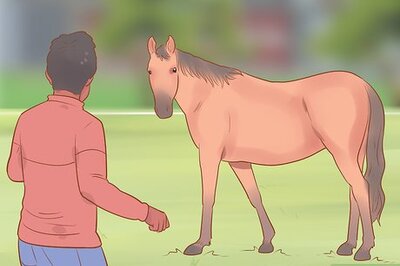
views
London: On his first day at Chelsea nearly nine years ago, Jose Mourinho declared himself "a special one" and he will have to do something rather special on his return there to disprove the old adage that you should never go back. Time and again, managers who have returned for a second, or even in rare cases, a third or fourth spell at their old English clubs have failed to achieve what they did first time around.
Mourinho has set his own bar very high at Stamford Bridge, becoming the most successful manager in the club's history during just over three years there by winning five major trophies between 2004 and 2007: the Premier League title in 2005 and 2006, the League Cup in 2005 and 2007 and the FA Cup in 2007.
Chelsea never lost any of their 60 home league matches while Mourinho was manager, but the love affair came to an end in September 2007 when, after a series of fallings out with owner Roman Abramovich, he left "by mutual consent". He now returns after a difficult season at Real Madrid and will want to prove that unlike many other managers, the magic can work a second time.
BUSBY MISTAKE
A famous example of a manager going back, although he never strictly left in the first place, is Matt Busby, who led Manchester United from 1945 until he stepped down in June 1969 a year after United were crowned European champions. Instead of stepping aside totally, a mistake which has now entered United's folklore as a serious error of judgement, Busby kept his office at Old Trafford and cast a huge shadow over his successor Wilf McGuinness.
Under McGuinness, United failed to rise above the ordinary during the 1969-70 season and after a poor first half of the following season, Busby returned in December 1970 as caretaker manager with McGuinness demoted to reserve team manager. Busby steered them to eighth in the old First Division, stepped down again at the end of the 1970-71 season, but could do nothing to stop the decline that began after they won the European Cup and ended with their relegation three years later. There have been other notable failures in more recent times too.
Kenny Dalglish led Liverpool to three League titles and two FA Cup successes during his first spell at Anfield between 1985 and 1991, but seemed like a man out of time after returning as manager in January 2011, although he did lead them to their first trophy in six years when they won the League Cup in 2012. Despite signing a three-year contract in May 2011, Dalglish was sacked a year later after Liverpool lost to Chelsea in the FA Cup final and finished eighth in the Premier League.
Everton, like Liverpool, enjoyed huge successes in the 1980s winning the league under Howard Kendall in 1985 and 1987, the FA Cup in 1984 and the European Cup Winners Cup in 1985. He then left Everton for Athletic Bilbao before returning to Goodison Park in 1990, winning nothing before leaving in 1993. His third spell at the club from 1997-98 ended with Everton avoiding relegation on the last day of the season.
NO JOY
Kevin Keegan also found no joy when he went back to Newcastle United. Keegan revitalised Newcastle as a player in the 1980s and did the same when he managed the club from 1992-97, nearly leading them to the title in 1996. But it was a very different story when he returned to St James' Park in 2008, failing to win any of his first eight matches in charge and eventually leaving the club eight months later after an acrimonious split with the club's hierarchy.
Occasionally a returning manager is more successful when he goes back. Harry Redknapp kept Portsmouth in the Premier League in 2004 but incurred the wrath of the Pompey fans when he left for their fierce rivals Southampton later that year. He returned in 2005 though, eventually won the Portsmouth fans over, kept them up again and led them to their first major honour for 58 years when they won the FA Cup in 2008.
Stoke City's Tony Pulis is another English-based manager to have gone back and done his reputation no harm. He first arrived in 2002 with the aim of avoiding relegation to the third tier, managed that, and stayed for three seasons. After a year at Plymouth Argyle he returned to Stoke, guided them back into the top flight for the first time in 23 years in 2008, and into their first ever FA Cup final in 2011 which earned them a place in the Europa League and a return to European competition after a 37-year absence.
But naturally, like everything else in soccer, the good times did not last for ever and he left the club at the end of this season after a disappointing second half of the campaign.
Lower league managers often go back to their former employees but it is relatively rare at the top of the English game. It is even rarer that managers surpass themselves second time around. But, as he said nine years ago, Mourinho thinks he is a special one, and for special ones, normal rules do not apply.



















Comments
0 comment